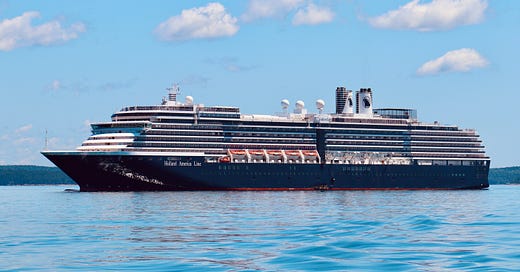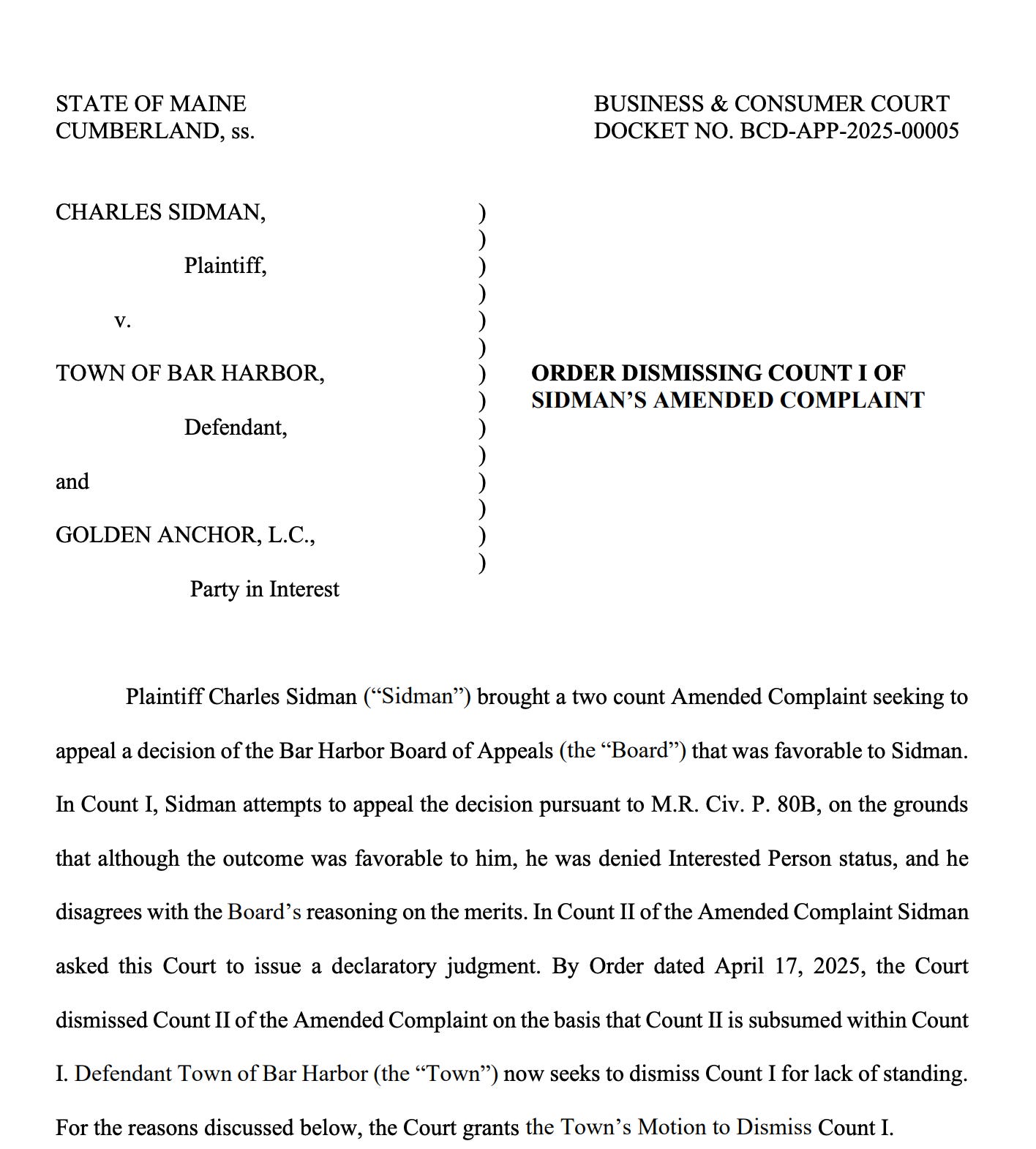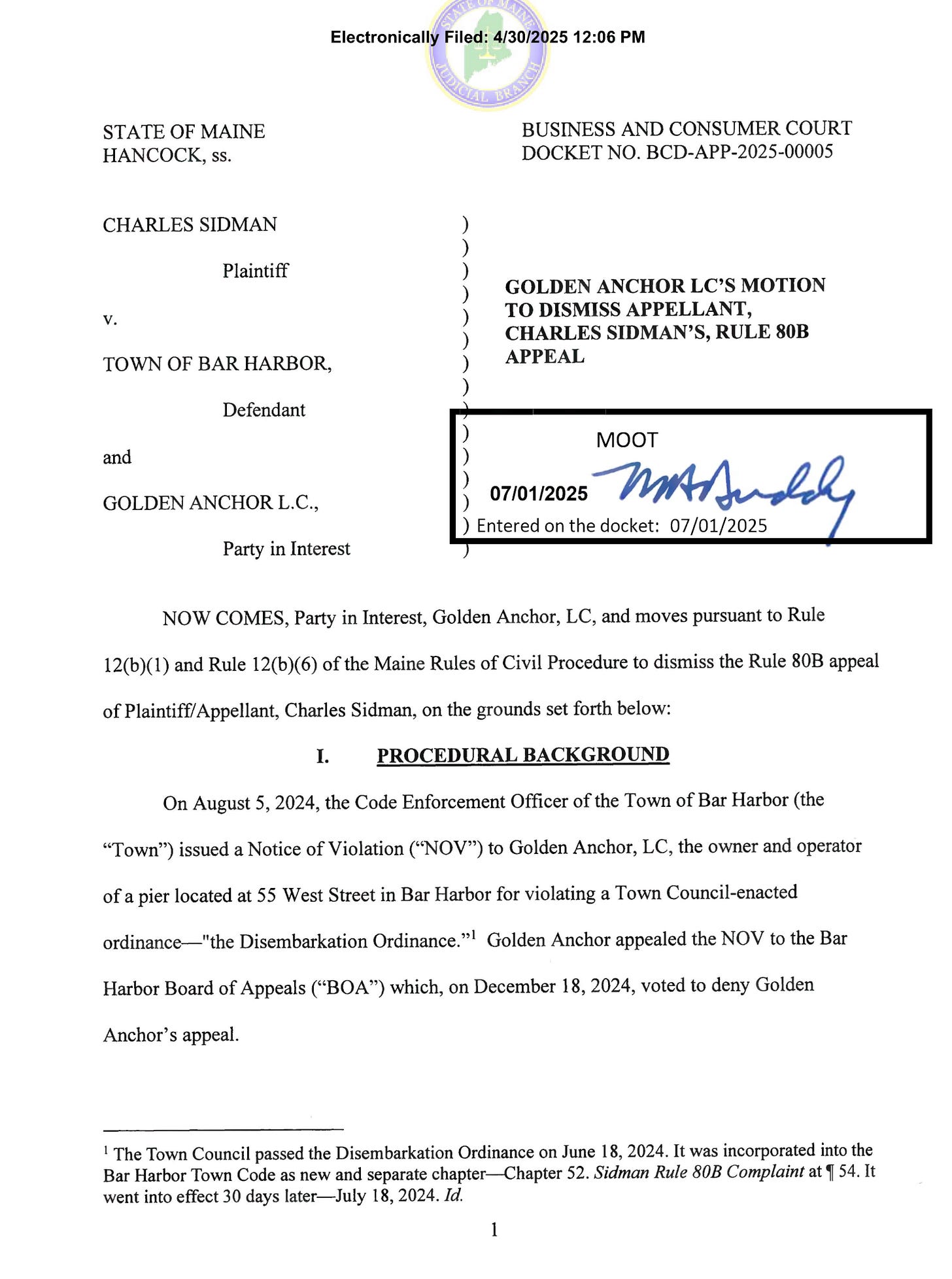Courts Declare Bar Harbor Short-Term Rental Case Moot, Dismiss Sidman's Amended Complaint, and a Golden Anchor's Motion Is Also Now Moot
The Bar Harbor Story is generously sponsored by Swan Agency Real Estate.
BAR HARBOR—In the past month, the town received multiple court opinions concerning three court cases that it has been involved with in the past few years.
Those cases do not include the federal appeal of the town’s cruise ship ordinance, which limits disembarkations to 1,000 a day without extra fees or penalties and changes the permitting/licensing structure of businesses disembarking those ships. That case, which went to the federal appeals court in Boston, still has not been decided.
The decisions also do not include judgement on a specific complaint about the town’s ethics commission and process concerning handling a complaint about an appeals board member.
MCCALLION VS THE TOWN OF BAR HARBOR
The first case involves a short-term rental dispute focused on property owners at the Bogue Chitto Lane subdivision.
Maine Superior Court determined that since the 2023 permit involved has now expired since it is 2025, there were no grounds for the case.
In a July 23, 2024, ruling, Hancock County Superior Court Justice Harold Stewart II had ruled in favor of the defendant Town of Bar Harbor and defendant intervenor, W.A.R.M. Management, LLC (WARM).
The ruling upheld the Bar Harbor Appeals Board’s decision, which voted against an appeal to revoke a short-term rental permit issued to WARM by then-Code Enforcement Officer Angie Chamberlain.
The original appeal occurred at a January 9, 2024, meeting of the Appeal’s Board and was brought by Brandan and Monika McCallion and Old Bears, LLC, who said that the short-term rental permit for a property at 12 Bogue Chitto Lane, which is owned by Roy and Marcia Levitt but registered under WARM, was invalid because it was issued after the yearly deadline of May 31. The McCallions own property near the Levitts’ property, at 11 and 16 Bogue Chitto Lane.
The Bar Harbor Appeals Board ruled in favor of the town and the Levitts at its January 9 meeting. Following the loss, Monika McCallion, et al., appealed to Hancock County Superior Court.
According to Chamberlain’s statements at the January 9 meeting, the Levitts were not at fault in this situation and the fault lied with a glitch in the software that the town uses for electronic vacation rental permit renewals, IworQ portal. The Levitts own two vacation rentals in Bar Harbor and paid for two renewals online with two renewal applications submitted.
“However, due to a glitch in the IworQ portal, the Administrative Assistant Tammy DesJardin, did not receive the two applications for VR-2 registration rentals, but only one application,” the staff report for the January 9 appeals board meeting reads.
Chamberlain decided there was enough evidence that Levitt had paid for her registration renewals on January 3, 2023, well before the May 31 deadline. On October 30, Chamberlain issued the renewal “to correct the error made by the town.”
During the January 9 meeting, the McCallions also argued that the Levitts had committed a violation by renting the VR-2 without a permit, not displaying a current permit within the rental unit as required by the ordinance, and not having the permit number listed on the advertising site for the vacation rental.
The town’s short-term rental ordinance was approved 1,260-840 in November 2021 and requires a yearly renewal and creates a 9% cap on rentals that are the primary residence of the property owner. Rentals that existed prior to that cap are still allowed as long as they pass inspections and renew their licenses. If they fail to renew that license, they would not legally have that sort of short-term rental in town and could choose to be put on a waitlist to try to get a permit again. That waitlist is not currently in use because the 9% cap has not yet been met.
In 2024 voters in two other island towns (Mount Desert and Tremont) rejected short-term rental ordinances.
According to an article by the Bangor Daily’s Bill Trotter, “The McCallions are former owners of Bar Harbor Manor, a 43-room hotel on Holland Avenue that they sold in 2022 for $8.1 million, according to MaineBiz. Their property at 16 Bogue Chitto Lane has an assessed value of $1.9 million, according to the town’s property tax records.
“The property at 12 Bogue Chitto Lane has an assessed value of $1.8 million. It was not clear Tuesday how much 12 Bogue Chitto Lane can be rented for but another property on the private dead-end road — on the opposite side of the McCallions’ property — can be rented at rates ranging from $5,600 to $16,100 per week, according to The Knowles Company.”
THE SECOND ORDER: SIDMAN V. THE TOWN OF BAR HARBOR
The second order involves Charles Sidman, a Bar Harbor resident and lead petitioner on the citizens’ petition that successfully led to a vote to create daily disembarkation limits.
Sidman’s complaint and reconsideration was about the town’s defense of the cruise ship disembarkation ordinance and had two counts. Both counts have now been denied.
The Business & Consumer Court had ruled in the town’s favor back in January. Judge Thomas McKeon denied Sidman’s motion earlier this June. Sidman had asked the court to reconsider its previous decision. He argued that the town honored cruise ship reservations for 2024 that had been made between March and November 8, 2022.
McKeon said that the case was moot because it was now 2025.
Sidman had also objected to being denied “interested party” status by the Bar Harbor Board of Appeals.
Sidman believed that since the town only placed fines on the Golden Anchor (where the ships disembark) in March 2025, the case should be reconsidered and that the issues were not resolved but continuing.
“The reasons for judicial restraint are evident here,” McKeon wrote in his June 6 decision. “The town has commenced a large enforcement action against a property owner. The town has the discretion, for efficiency’s sake, to decline to litigate enforcement of those disembarkations where the property owner has a defense versus those where the town has a stronger case. Municipalities make those types of litigation decisions every day. The court has no authority to intervene.”
The Golden Anchor has challenged, in Hancock County Superior Court, the Bar Harbor Board of Appeals’ decision that upheld the town’s notice of violation against the pier owner, January 31.
That complaint involves the company’s ability to disembark cruise ships at its location on West Street, the Harborside Pier, which is also known as the Golden Anchor Pier. It was filed by Timothy C. Woodcock, Esq. of the firm Eaton Peabody.
That notice of violation (NOV) concerns the pier’s lack of a daily town permit to disembark cruise ship passengers at 55 West Street, which is where it has been historically accepting cruise ship passengers prior to the town’s rule changes limiting those passengers according to daily caps and requiring a permit rather than a license to do so. The rules also do not allow more than 1,000 to disembark without fees.
Sidman argued that he should have standing in the case. The town argued he should not.
Though Sidman agreed with the Bar Harbor Board of Appeals’ decision, he did not agree with the board’s reasoning.
"Sidman would have preferred that the board’s decision find that disembarking vacationing cruise ship passengers is not a permitted use in the zoning district. Nevertheless, the board’s decision grants the relief Sidman was seeking," according to the July 1 decision.
The court agreed with the town, July 1, focusing mostly on defining particularized interest and interested party status, writing, “The board’s decision to deny Sidman interested party status is not an essential finding on which its decision was based, and thus it would seem the exception does not apply. And the board’s comment that disembarking passengers is a permitted use in the zoning district is not an essential finding. Since Golden Anchor did not have a permit, the board did not need to address the zoning issue. Even if the comment were essential to the board’s decision, it would not matter. Since Sidman was not a party before the board, collateral estoppel would not preclude him from making any arguments in future proceedings in which he is involved. See Town of Mount Vernon v. Landherr, 2018 ME 105, ¶ 15, 190 A.3d 249. Accordingly, the exception does not save Sidman’s appeal.”
On the five-page July 1 order, the court also wrote, “Applying the exception in this case, which would effectively transform the nature of the present action from permitting case into zoning case, would allow the exception to swallow the rule. Sidman does not have grounds to appeal judgment that grants the relief he sought simply because he would prefer the board's decision to rest on different reasoning.”
The town’s appeals board determined on June 24 that Sidman didn’t have standing to appeal the cruise ship disembarkation permit to the town itself at the town’s pier. That decision also centered around particularized injury. The Mount Desert Islander has reported that Sidman will likely also appeal that appeals board decision.
THE THIRD BIT OF MOOT: SIDMAN VS TOWN OF BAR HARBOR AND GOLDEN ANCHOR, LC
The third order is related to that second complaint.
Sidman had hoped to participate as an interested party, not just a member of the public, in the town’s board of appeals meeting about the Golden Anchor’s notice of violation for disembarking cruise ships.
The board of appeals on December 10 said Sidman was not an interested party but could speak as a member of the public. Sidman appealed that decision. The Golden Anchor moved to dismiss Sidman’s court appeal. It was determined to be moot because of that order.
LINKS TO LEARN MORE
Other filings available at the town’s site.
Follow us on Facebook. And as a reminder, you can easily view all our past stories and press releases here.
If you’d like to donate to help support us, you can, but no pressure! Just click here (about how you can give) or here (a direct link), which is the same as the button below.
If you’d like to sponsor the Bar Harbor Story, you can! Learn more here.









